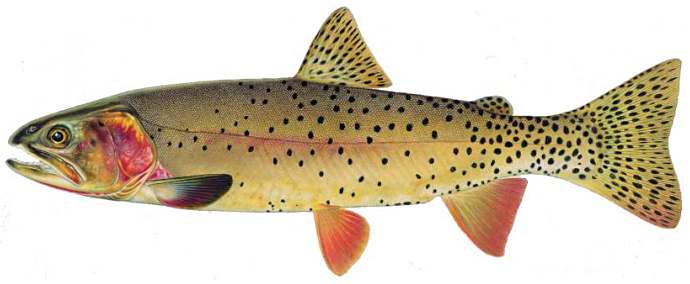SNEAKYFOOTING
THE MEADOWS
THE MEADOWS
Gallatin Producing Results
 .. It took just a few days for the fish in the Gallatin River to figure it out:
.. It took just a few days for the fish in the Gallatin River to figure it out:  the water cleared, the water warmed, the flies erupted, the fisher folk came, and the fish started dodging artificials.
the water cleared, the water warmed, the flies erupted, the fisher folk came, and the fish started dodging artificials... The big meadows are still saturated and will telegraph your footfalls from quite a distance.
.. Doing battle with the willows does not enhance your stealth attacks, and a gentle sauntering approach is recommended.
.. From the Bighorn Trail Head to the Fan Creek confluence is a dense jungle.
 Tread softly and take your time. There are still some excellent catching opportunities.
Tread softly and take your time. There are still some excellent catching opportunities... The caddis are profuse and seem to be hatching all day in this warm summer interlude. There are two very small caddis flies that the trout seem to be keying on in the afternoon. One is nearly white, the other is light tan.
.. There are also some terrestrials in the meadows and around the timber. Even though the fish are becoming their reclusive selves, they are not overly selective at this point.
-------
.. A few years ago Jeff Morgan penned a two-part treatise on the caddis larvae and their imitative patterns. It's an interesting set of observations that apply across the western states. The Westfly series can be found HERE --> (Part One, Part Two.)
be found HERE --> (Part One, Part Two.).. One very successful caddis larvae pattern is the Koudelka Killer. It is startlingly reminiscent of the pink-bodied Feather Dusters that we use on most of the upper Gallatin River.
.. Down the valley, and as far as Black Butte,
 even to Snowflake Springs, there is still good subsurface action on small stone fly imitations and the standard assortment of nymphs. Heads of pools with well defined streams that debauch from long riffles are most productive for the remaining stone fly nymphs. You know just where they are too!
even to Snowflake Springs, there is still good subsurface action on small stone fly imitations and the standard assortment of nymphs. Heads of pools with well defined streams that debauch from long riffles are most productive for the remaining stone fly nymphs. You know just where they are too!.. The caddis are thick here too, and non stop action can be had from about 4:00 PM until dark thirty.

.. The river is just a bit high for this time of year; it is, however, clear as can be and catching is just fine - thank you.
.. There are a few PMD's in the morning for the early risers. And, as the river warms up this hatch will become more widespread, (over the next two weeks or so.)
.. The standard fly box for most of the Gallatin River in Yellowstone National Park will contain: Yellow Stimulator, Elk Hair Caddis, Yellow & Pink Feather Dusters, Prince Nymph, Adams, and a few of your favorite terrestrials, (ants, beetles, and yellow woolly worms.)
-------
.. You should be advised that there are at least two grizzly bears prowling the meadows. Dead elk seem to be the culprits... Down around Black Butte is a precocious youngster that has not seemed to be afraid of cars, people, or
 fisher folk.
fisher folk... In and around the confluence meadow and up the Fan Creek Draw there is a larger bear that is being very protective of it's lunch.
.. And then - there's the moose. They are enjoying the lush vegetation of the meadows and stream banks. If you concentrate only on the fish - you are liable to get stomped.
.. Bear spray - in hand - is a mandatory behavior. Loud bawdy songs, guffaws at sleazy jokes, and frequent pauses for loud conversation are also useful tactics for access.

.. The successful angler will be adept at a loudly quiet, sneakily obvious, and gently raucous approach. This is a talent that requires years of fishing in bear and moose meadows.
-------
.. Fan Creek is also coming around nicely. But, and it's a BIG BUT, the bear is prowling, the beavers are active and have flooded the trail, (stock access is denied,) and traversing in muck, mush and mire is required to access the better portions of the lower meadows... Despite the bears, beavers, and moose; the heat of our summer interlude is just now beginning and thankfully, mosquitoes are not the problem that they can be - don't get used to it!






.jpg)




